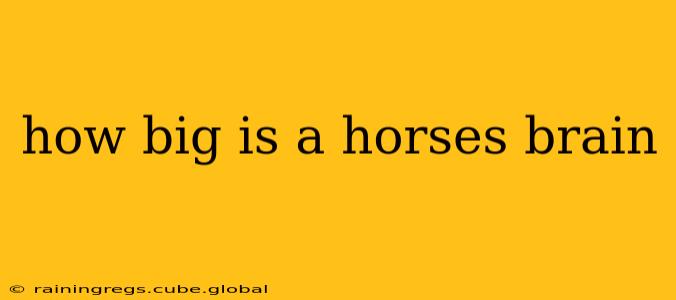The size of a horse's brain is a surprisingly complex question, with the answer depending on several factors. There's no single definitive answer like "X cubic centimeters," as brain size varies depending on the breed, age, and even individual horse. However, we can explore the average size and how it relates to equine intelligence and capabilities.
What is the average size of a horse's brain?
A horse's brain is considerably larger than that of many other mammals relative to its body size. While precise measurements vary across studies, a reasonable estimate for the average adult horse brain weight is between 500 and 600 grams. This is significantly smaller than a human brain, which typically weighs around 1300-1400 grams, but it's crucial to remember that brain size alone isn't a perfect indicator of intelligence.
How does a horse's brain size compare to other animals?
Comparing brain size across species requires careful consideration of body size. Scientists often use the encephalization quotient (EQ), which compares brain size to expected brain size for an animal of its body mass. Horses have a relatively high EQ, indicating a larger brain than predicted based on their body weight alone. This suggests significant cognitive abilities.
Is a larger brain size better for horses?
While a larger brain generally correlates with more complex cognitive abilities, it's not a simple equation. The structure and organization of the brain are equally important. Horses possess a well-developed cerebrum, responsible for higher-level functions like learning, memory, and problem-solving. Their brains also exhibit a sophisticated limbic system, associated with emotions and social behavior.
How does brain size relate to a horse's intelligence?
Horse intelligence is multifaceted and extends beyond simply brain size. They display remarkable abilities in:
- Social intelligence: Horses live in complex social groups, exhibiting intricate communication and social structures.
- Learning and memory: Horses are known for their ability to learn and remember a wide range of tasks, from simple commands to complex routines.
- Problem-solving: Studies have demonstrated their capacity to solve problems, adapt to new situations, and even display self-awareness.
What parts of a horse's brain are most important for its capabilities?
Several brain regions contribute to a horse's impressive abilities. The hippocampus, crucial for memory formation, is well-developed. The cerebellum, responsible for motor control and coordination, is also significant given their athleticism and coordination. Finally, the amygdala, vital for processing emotions, is large, reflecting their sensitive and expressive nature.
What factors affect the size of a horse's brain?
Several factors influence the size of a horse's brain:
- Breed: Some breeds may have slightly larger or smaller brains on average than others. This is likely due to genetic factors and selective breeding.
- Age: Brain size increases during development and may slightly decrease in old age.
- Nutrition: Proper nutrition during development is vital for optimal brain growth and function.
- Individual variation: Just like humans, horses exhibit individual differences in brain size and cognitive abilities.
In conclusion, while we can estimate the average size of a horse's brain, focusing solely on its weight overlooks the complex interplay of brain structure, organization, and genetic factors that determine their remarkable intelligence and capabilities. The size is a starting point for understanding their cognitive potential, but it's far from the whole story.
